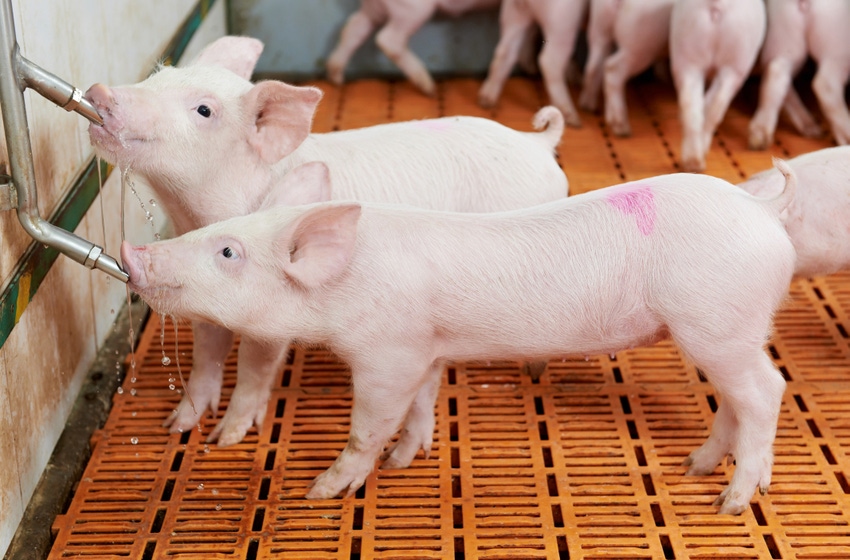USDA researcher: ASF vaccine still years away
Plum Island researchers making progress in development and seeking commercial partner.

Despite recent reports that a “highly effective” African swine fever (ASF) vaccine has been developed, a U.S. Department of Agriculture scientist recently said a commercial compatible vaccine is probably still years away.
Douglas Gladue, senior scientist in the Foreign Animal Disease Research Unit at the Plum Island Animal Disease Center within USDA's Agricultural Research Service, has been leading researchers to try to find faster alternatives for creating recombinant ASF virus (ASFV) in-field strains.
In a recent article, Feedstuffs’ sister publication National Hog Farmer reported:
The addition of fluorescent markers has allowed for faster purification of recombinant viruses, and utilizing CRISPR-Cas9 gene editing technology has produced a 4-log increase in initial recombination. However, Gladue relayed that the development of live attenuated vaccines was largely based on research in the 1990s using historical isolates where deletion of non-essential virus genes involved in virus virulence in swine were used to make recombinant ASFV in the current outbreak strain.
"These historical deletions were successful in attenuating African swine fever Georgia, but not to the same extent of historical isolates. The need for safe, more attenuated vaccine led us to identify several new African swine fever protein targets," Gladue said.
To do this, the Plum Island team created a custom computational pipeline that takes into account different sources of bioinformatics and functional genomic data and identifies several genetic targets for deletion. The researchers looked at the gene EP152R -- a CCL2-like protein, which was essential and could not be deleted -- and they also examined L83L, an Il-1 binding protein, but deletion of L83L did not attenuate the virus. They decided to focus their efforts on a previously uncharacterized gene, I177L, that was identified by their pipeline.
Located on the reverse strand, I177L is highly conserved among all isolates. A late transcribed gene, I177L is predicted to be an immune modulatory protein. I177l was determined not to be an essential gene. Deletion of I177l only modestly affected virus growth in macrophages, but high titer stocks needed for vaccine production can be achieved.
"With our new vaccine platform, we saw that we had the highest degree of attenuation for any live attenuated vaccine that protects against the African swine fever virus strain Georgia," Gladue said. "We had complete protection even at a dose of 102 and the vaccine lacks any residual virulence, even at doses as high as 106. This is the first ASFV vaccine that does not induce viral shedding and induces sterile immunity. ASFV-G-ΔI177L has the highest safety profile of any live attenuated vaccine that protects against African swine fever Georgia."
So, what are the next steps for the Plum Island team in developing an ASF live attenuated vaccine?
"We have three functional single-dose, live attenuated vaccine platforms. We have licensed our ASFV-G-Δ9GLΔUK and ASFV-G-MGF platforms. For ASFV-G-ΔI177L, we are seeking a commercial partner," Gladue said. "We have a commercial partner to develop a DIVA (differentiating infected from vaccinated) platform in our double deletion platform, which will include safety tests and reversion to virulence, development and certification of the DIVA test. Right now, the introduction of DIVA and all of our platforms is under way. We have six DIVA targets that have been identified. We know at least two are non-essential, and we've confirmed a strong immune response of serum samples from ASF-positive animals. Our preliminary results confirm that these DIVA targets work by [enzyme-linked immunosorbent asssay]; however, we know that a commercial DIVA-compatible vaccine is probably still years away."
Promising vaccine candidate
In related news, during a call with media this week, Dr. Liz Wagstrom, chief veterinarian for the National Pork Producers Council, said discussions with USDA have shed light on the promising candidate for a vaccine master seed.
“They have found they are able to actually develop neutralizing antibodies using that, which is something previous candidates have not. The challenge they have is that they are growing vaccine virus right now in swine macrofile cells, which are harvested every time you need to use them from a pig through long lovage -- not a continuous cell line like is used in a laboratory that produces vaccine,” she said.
Getting the master virus adapted to grow in a cell line that can actually be used in laboratory conditions and to be able to grow that virus at a high enough rate to be made into a vaccine will be the greatest challenges, Wagstrom said, adding, “Encouraging news: It is a potential long-term tool we would have, but not in the near future.”
About the Author(s)
You May Also Like




.png?width=300&auto=webp&quality=80&disable=upscale)
